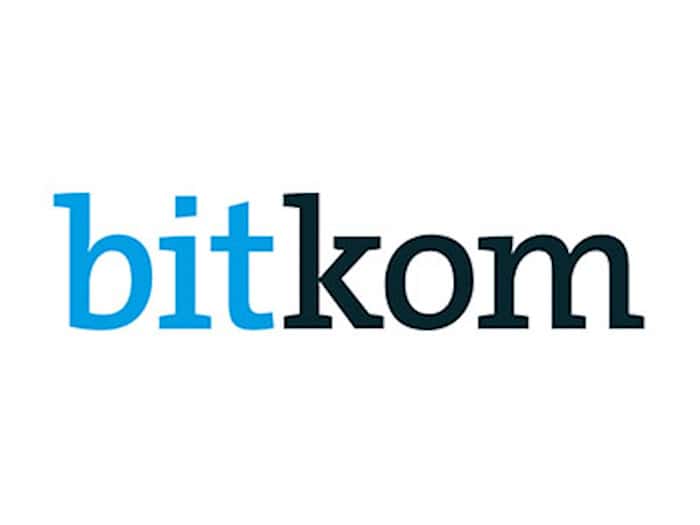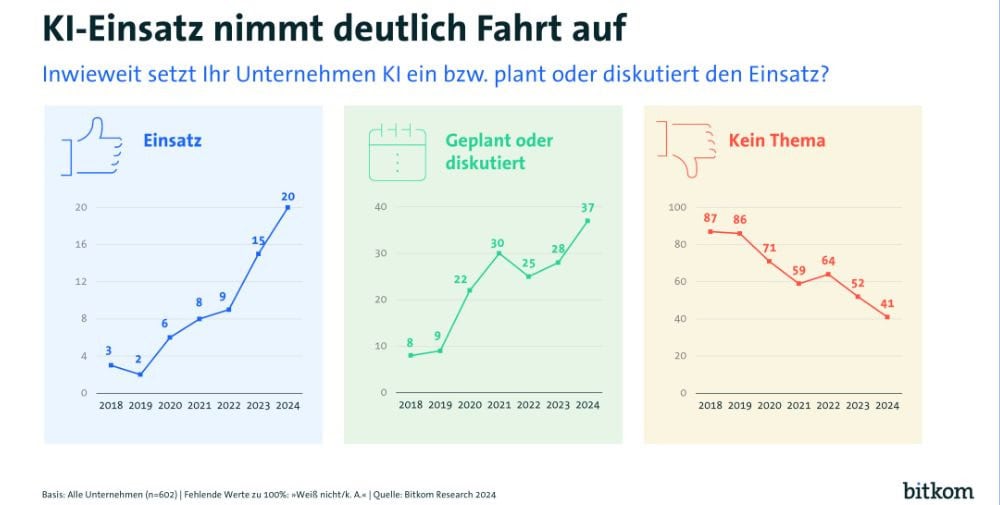
“There is great openness towards AI in Germany and great expectations of AI, both in the economy and among the population. AI will reshuffle the cards in many areas. For Germany, this must mean that we don’t just want to play along, we want to win,” says Bitkom President Dr. Ralf Wintergerst.
From security and traffic to schools and sport: where people want AI
People want AI to be used in numerous areas of life. A clear majority are in favor of AI use in cyber security (80 percent), in administration, transport and mobility (78 percent each), in healthcare (75 percent), for the environment and sustainability (67 percent), in the police (66 percent) and in education (59 percent). Around half of the population would like to see AI in online retail (55%), banking and insurance (53%), the justice system (50%), sport (48%) and the military (46%). Support is lowest in politics (42%), the legal sector (41%) and the arts and culture (38%). “People see the potential of AI and want it to be used. Anyone who experiences AI on their smartphone, for example, also wants this convenience when dealing with authorities and public institutions,” says Wintergerst.
Generative AI is currently gaining particular importance. Users ask questions or give instructions in natural language and the AI generates text, images, videos, music or even program code in response. Four out of ten Germans (40 percent) have now tried generative AI such as ChatGPT, Google Gemini, Claude from Anthropic or Microsoft Copilot at least once: 15 percent use generative AI frequently, 13 percent rarely and 12 percent have so far only tested it once. A further third (34%) can imagine using it in the future, but around a fifth (22%) do not want to have anything to do with generative AI. Those who have used generative AI mainly generate texts (70 percent), followed by images (53 percent) and then by a wide margin videos (9 percent), software code (5 percent) and music (3 percent).
Only 9 percent of companies use generative AI
Companies are divided when it comes to the trend topic of generative AI. Every second company (48 percent) assumes that companies that do not use generative AI have no future. Conversely, almost one in two companies (46%) say that generative AI may look spectacular, but is of little benefit to the company. “Gone are the days when companies had to ask themselves whether generative AI could bring them benefits. Today, it’s no longer a question of whether, it’s just a question of how, when and where,” says Wintergerst.
Many companies are still reluctant to use generative AI. Only 9 percent of companies use generative AI, while 18 percent are planning to use it. A further 19 percent can at least imagine using it. However, a quarter (23%) have decided against generative AI and 28% have not yet looked into the topic. The vast majority of companies that already use generative AI use it as part of their products or services (80%). 43 percent use it to support internal business operations in individual areas of the company, while 3 percent even use it in all or almost all areas of the company.
Generative AI is primarily used in customer contact and marketing
Generative AI is currently used most frequently in customer contact (89 percent). This is followed at a considerable distance by its use in marketing and communication (40 percent). Around a fifth each use generative AI in research and development (20%) and within production processes (17%). Only 7% use generative AI in management, just 3% in the HR department and 2% in the IT department. Another 2 percent use generative AI for knowledge management in general and only 1 percent in the legal or tax department. However, there could soon be changes here. 62% of companies that are currently planning to use generative AI want to use it in customer contact in the future, 39% in marketing and communication. This is followed in third place by general knowledge management (26%), followed by use in production processes (19%), management (16%) and the IT department (13%). The legal and tax departments remain in last place with just 2 percent. “As generative AI continues to develop, so too will the possible applications in companies. In the future, generative AI will move into practically all areas of the company,” says Wintergerst.
The majority of employees are in favor of using generative AI, but there is also resistance. 24 percent of employees would definitely like AI help with their work, while 33 percent are more open to it. 20 percent tend to reject it, and 20 percent do not want AI support under any circumstances. 13 percent state that they already use generative AI to take over tasks. 17% believe that such support is already possible today, but that they do not use AI in their job. 31% do not currently see any potential use for existing AI solutions, but believe it is possible in the future. Only just over a third (35 percent) believe that generative AI cannot support them in any of their tasks.
Better analysis and fast processes thanks to AI, but legal uncertainty puts the brakes on
Those companies that already use generative AI cite faster and more precise problem analyses (70 percent) and accelerated processes (63 percent) as the biggest advantages of the technology. For 62%, generative AI provides expert knowledge that would otherwise not be available in the company. 59% say that generative AI makes companies fit for the future and 55% see increased competitiveness. However, there are also a number of external and internal obstacles to the use of generative AI. For example, 82% of companies are concerned about future legal restrictions on the technology, 73% feel hindered by data protection requirements and 68% are unsettled by legal hurdles and uncertainties. “Companies need legal certainty quickly so that we can achieve international parity in the development and use of AI. Politicians are called upon to shape regulation in such a way that Germany becomes a leading AI location,” says Wintergerst. “We must not tie a regulatory block to artificial intelligence.”
German companies see the USA and China as leaders in generative AI
According to German businesses, the USA and China are currently leading the race for generative AI. Thirty-six percent see the USA as the leader in this field, 32 percent China. Israel is already well ahead in third place with 4 percent, followed by Japan (3 percent) and South Korea (2 percent). Just 1% of the companies in Germany ascribe a leading role to Germany and 3% to Europe as a whole. One in ten companies (10 percent) does not currently see any nation as a leader. At the same time, 7 out of 10 companies (71%) call for politicians to provide more support for German providers of generative AI. 72% believe that politicians should invest in data centers for AI in order to promote the use and development of AI in Europe. 64% want Germany to provide more funding for AI research and development in general. Around three quarters (74%) complain that politicians in Germany have not taken the topic of AI seriously for too long. “For a long time, Germany was a leader in AI research and was one of the first countries to have an AI strategy. Today, we have a number of promising AI start-ups and, with DeepL and Aleph Alpha, we also have major players and important industrial companies that focused on AI at an early stage. Nevertheless, we are now lagging behind the USA when it comes to generative AI,” says Wintergerst. “AI, and generative AI in particular, is becoming a basic technology. Politics, business and science must work together to ensure that we achieve a global leadership role in AI – both in research and development and in its application on the market.”
Artificial intelligence is also a key topic at the German government’s digital summit on October 21 and 22 in Frankfurt am Main. On this occasion, Bitkom will publish a study report with these and other results of the population and company survey.
– – – – – –
Further links
👉 www.bitkom.org
Graphic: Bitkom




